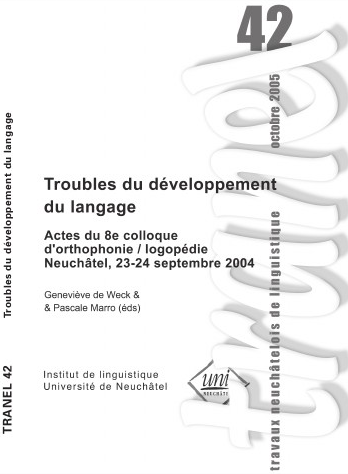Théorie de l’esprit et compétences pragmatiques chez des enfants présentant des troubles du langage: le cas du malentendu
DOI :
https://doi.org/10.26034/tranel.2005.2627Résumé
Misunderstanding due to lexical ambiguity arising in a dialogue has been chosen as a favorable case of an auditor’s false belief about the communicative intention of the speaker. 18 children aged 6 to 9 presenting various language disorders and 28 children of similar ages frequenting ordinary school classes have been individually faced with a conversation about objects between two speakers (represented by two Playmobil®) who used the French noun glace in two different meanings («mirror» and «ice cream»); children were then asked to explain the utterances occurred (detection question) and to predict the next exchange (repair question). Results show that detection in terms of the speaker’s false belief as well as appropriate conversational repair of misunderstanding develops later in children with language disorders than in the control group, as predicted. However, 8-year old children perform similarly in both groups, especially for detection. Linguistic competences (on lexical, syntactic and pragmatic levels) differently involved in both tasks are invoked to explain the results. The role of the experimenter’s support due to the clinical method, and the ecological validity of the situation for a relevant approach of pragmatic aspects in the field of speech pathology are further issues of the research.Téléchargements
Publié-e
01-10-2005
Comment citer
Monney, V., & Berthoud, I. (2005). Théorie de l’esprit et compétences pragmatiques chez des enfants présentant des troubles du langage: le cas du malentendu. Travaux neuchâtelois De Linguistique, (42), 123–139. https://doi.org/10.26034/tranel.2005.2627
Numéro
Rubrique
Article thématique


